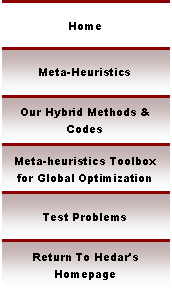

|
Global optimization refers to finding the extreme value of a given nonconvex function in a certain feasible region and such problems are classified in two classes; unconstrained and constrained problems. Solving global optimization problems has made great gain from the interest in the interface between computer science and operations research. In general, the classical optimization techniques have difficulties in dealing with global optimization problems. One of the main reasons of their failure is that they can easily be entrapped in local minima. Moreover, these techniques cannot generate or even use the global information needed to find the global minimum for a function with multiple local minima. The interaction between computer science and optimization has yielded new practical solvers for global optimization problems, called meta-heuristics. The structures of meta-heuristics are mainly based on simulating nature and artificial intelligence tools. Meta-heuristics mainly invoke exploration and exploitation search procedures in order to diversify the search all over the search space and intensify the search in some promising areas. Therefore, metaheuristics cannot easily be entrapped in local minima. However, metaheuristics are computationally costly due to their slow convergence. One of the main reasons for their slow convergence is that they may fail to detect promising search directions especially in the vicinity of local minima due to their random constructions. Combining meta-heuristics with local search methods is a practical remedy to overcome the drawbacks of slow convergence and random constructions of meta-heuristics. In these hybrid methods, local search strategies are inlaid inside metaheuristics in order to guide them especially in the vicinity of local minima, and overcome their slow convergence especially in the final stage of the search. |
|
Global Optimization |

